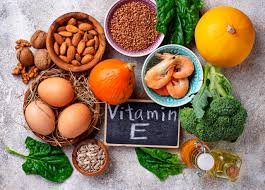We’ve all heard it—Vitamin E is great for skin and hair, and we should include it in our diet and skincare routine. But how much of this is true, and what do we really need to know?
Let’s dive into the essentials:
-
What is Vitamin E?
-
What happens if your body lacks it?
-
Is it really necessary for healthy skin and hair?
-
Which foods are rich in Vitamin E?
What is Vitamin E?
Vitamin E, also known as Alpha-Tocopherol, is a fat-soluble vitamin. That means once consumed in adequate amounts, it gets stored in the body for a long time.
A Powerful Antioxidant
Vitamin E acts as a strong antioxidant, which means it protects our body from free radical damage. Free radicals are harmful molecules that can accelerate aging, damage cells, and even contribute to the development of cancer.
Key Functions of Vitamin E
Here’s what Vitamin E does for your body:
-
Neutralizes free radicals to reduce cell damage
-
Slows down signs of aging and helps prevent some cancers
-
Boosts immune function, keeping infections at bay
-
Prevents blood clot formation (atherosclerosis), lowering the risk of heart attack and stroke
-
Supports eye health and maintains normal vision
How Much Vitamin E Do You Need?
For adults, the recommended daily intake is about 15 mg, or 22 International Units (IU).
In pregnant and breastfeeding women, the requirement is slightly higher.
Is Vitamin E Deficiency Common?
Vitamin E deficiency is extremely rare.
Why? Because it’s found in a wide range of everyday foods. Most people naturally get enough through their diet.
Who May Experience a Deficiency?
-
People with digestive disorders (like Crohn’s or celiac disease)
-
Those with chronic malabsorption issues
-
Individuals on very restricted diets
Symptoms of Deficiency:
-
Weakened immunity
-
Frequent infections
-
Retinopathy (gradual vision loss)
-
Neuropathy (tingling, numbness, or swelling in nerves)
-
Higher risk of blood clots, heart attacks, and strokes
Do You Really Need to Take Vitamin E for Skin and Hair?

If you’re healthy and eating a balanced diet, you likely don’t need to take Vitamin E supplements for skin or hair.
That said, Vitamin E is widely used in skincare products for its moisturizing and anti-aging properties. It helps soothe dry skin and improve skin texture when applied topically.
So, for external benefits—creams and oils rich in Vitamin E can be effective. But taking excess supplements without deficiency offers little added benefit and may even lead to toxicity, since it accumulates in the body over time.
Natural Sources of Vitamin E

Vitamin E is mostly plant-based, found in seeds, nuts, fruits, vegetables, and grains. Here are some rich sources:
-
Nuts: Almonds, peanuts, hazelnuts
-
Seeds: Sunflower, safflower
-
Vegetables: Spinach, broccoli, red bell peppers
-
Fruits: Mangoes, avocados
-
Grains: Whole wheat, wheat germ
-
Oils: Soybean oil, sunflower oil
-
Others: Pumpkin, butter
With such variety, it’s easy to meet your daily Vitamin E requirement through food alone.
Final Thoughts
Vitamin E plays a vital role in protecting your body from oxidative stress, supporting immunity, and maintaining healthy skin and vision.
But unless you’re diagnosed with a deficiency or have a medical condition affecting absorption, you probably don’t need extra supplements.
Focus on a balanced, plant-rich diet, and use Vitamin E-infused skincare products for external nourishment.
Would you like meta title, description, and focus keywords for this content too?